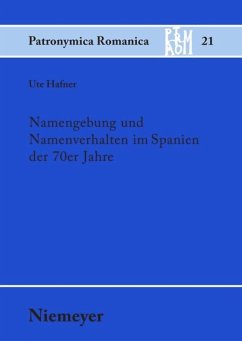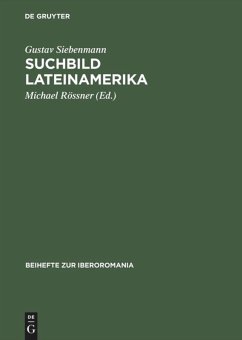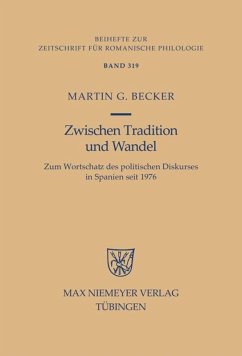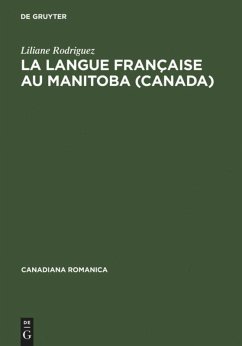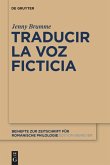This study on the changes in Spanish forename-giving in the post-Franco era is based on an indirect interrogation of 13 adolescents in different regions of Spain. Against the background of the new Spanish legislation on names, it inquires into various aspects of the issue: the extent to which name-giving still accords with traditional patterns, the continued ubiquity of names based on Maria, the degree to which names are more regionally colored in the autonomous areas of the country, and the existence of a trend toward greater internationalization in the names given. Another central concern is unofficial name-giving. First names, nicknames, short forms, and cognomina are considered both in formal and intensional terms.
Die Untersuchung der Veränderungen der offiziellen spanischen Vornamengebung in der Nach-Franco-Ära basiert auf einer indirekten Befragung von 20.000 Jugendlichen der Geburtsjahrgänge 1968-1982. Der Fragebogenrücklauf beläuft sich auf ein Drittel, sprich rund 7.000 Rückantworten.
Vor dem Hintergrund des in den 70er Jahren neu gefaßten spanischen Vornamenrechts wird geprüft, ob die Namengebung weiterhin traditionellen Mustern folgt, der Name María bei Beilegung auf Devotion beruht, oder vielmehr ein Verlegenheitsname oder Automatismus ist, die vielen Advokationsnamen Namenmoden ausbilden, in den neu geschaffenen Autonomien (Baskenland sowie angrenzende Gebiete; Katalonien, die Balearen und Valencia sowie Galicien) die Namenwahl zusehends regional gefärbt ist, und ob der Vornamenschatz sich internationalisiert, nebst den sich daraus ergebenden gesamtgesellschaftlichen Implikationen.
Einen zweiten Schwerpunkt bildet die inoffizielle Namengebung: Ruf-, Kose- undÜbernamen. Ruf- und Kosenamen können formal auf Suffigierung beruhende Namenerweiterungen sein. Namenverkürzungen gehen entweder auf morphologische Mechanismen (Apokope, Aphärese oder Synkope sowie Kombinationen daraus) zurück und/oder basieren auf phonologischen Veränderungen, die sich aus dem noch rudimentär ausgebildeten phonematischen Apparat eines Kleinkindes ergeben. Die Übernamen erfahren eine formal-intensionale Klassifizierung.
Die Untersuchung der Veränderungen der offiziellen spanischen Vornamengebung in der Nach-Franco-Ära basiert auf einer indirekten Befragung von 20.000 Jugendlichen der Geburtsjahrgänge 1968-1982. Der Fragebogenrücklauf beläuft sich auf ein Drittel, sprich rund 7.000 Rückantworten.
Vor dem Hintergrund des in den 70er Jahren neu gefaßten spanischen Vornamenrechts wird geprüft, ob die Namengebung weiterhin traditionellen Mustern folgt, der Name María bei Beilegung auf Devotion beruht, oder vielmehr ein Verlegenheitsname oder Automatismus ist, die vielen Advokationsnamen Namenmoden ausbilden, in den neu geschaffenen Autonomien (Baskenland sowie angrenzende Gebiete; Katalonien, die Balearen und Valencia sowie Galicien) die Namenwahl zusehends regional gefärbt ist, und ob der Vornamenschatz sich internationalisiert, nebst den sich daraus ergebenden gesamtgesellschaftlichen Implikationen.
Einen zweiten Schwerpunkt bildet die inoffizielle Namengebung: Ruf-, Kose- undÜbernamen. Ruf- und Kosenamen können formal auf Suffigierung beruhende Namenerweiterungen sein. Namenverkürzungen gehen entweder auf morphologische Mechanismen (Apokope, Aphärese oder Synkope sowie Kombinationen daraus) zurück und/oder basieren auf phonologischen Veränderungen, die sich aus dem noch rudimentär ausgebildeten phonematischen Apparat eines Kleinkindes ergeben. Die Übernamen erfahren eine formal-intensionale Klassifizierung.

